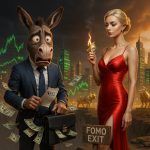
The Edge of the Abyss: The Hidden Cost of Investment Stress
Apr 14, 2025
It starts with a whisper. A faint static in the back of your mind. The charts don’t align, the markets feel erratic, and every headline screams uncertainty. Then the whisper turns into noise, and the noise becomes deafening. Investment stress isn’t just emotional—it’s physiological. It seeps into your veins, warping your judgment, clouding your vision, and leaving you paralyzed on the edge of opportunity. The market doesn’t care about your stress. It thrives on it. It feeds on your hesitation, your frantic reaction to chaos, your inability to think clearly when the world tilts sideways.
Here’s the brutal truth: most investors lose not because they lack knowledge but because they lack control. Investment stress is the silent assassin of portfolios. It triggers irrational decisions, blinds you to emerging opportunities, and keeps you tethered to the safety of mediocrity. But for those who master it—for those who can stand on the precipice of fear and not flinch—the rewards are extraordinary. The question is: will you let the stress own you, or will you use it as fuel?
The Physics of Fear: Investment Stress as Energy
Stress is energy. It doesn’t vanish—it transforms. In physics, energy can neither be created nor destroyed, only converted from one form to another. Investment stress operates the same way. It’s the kinetic force that propels markets into frenzy, the potential energy stored in the fear of every investor waiting for the next collapse. The trick is not to eliminate stress but to transmute it. To turn fear into focus, chaos into clarity.
Think of it like a particle accelerator. Markets are vast, chaotic systems where information collides at incomprehensible speeds. The collision creates heat, friction, and stress. But within those collisions are the building blocks of opportunity, the fragments of insight that others miss. The investor who understands this doesn’t avoid stress—they harness it. They channel it into sharper analysis, bolder moves, and steadier hands.
Stress, when controlled, is a weapon. When uncontrolled, it’s a runaway reaction—a chain of bad decisions that compounds like nuclear fission. The choice is yours: will you let stress explode, or will you contain it and use it to your advantage?
The Paradox of Certainty: Why Safety Is the Enemy
Here’s the paradox: the more you seek certainty, the more investment stress you create. Safety is an illusion, a siren song that lures you into stagnation. The investors who cling to it chase predictability, but the market is anything but predictable. It’s a quantum system, existing in a state of constant flux, where stability is the exception, not the rule.
The greatest opportunities lie in uncertainty, in the moments when the market fractures and the herd panics. It’s in these moments that stress becomes a dividing line—a test of who can think strategically and who succumbs to fear. Certainty is comforting, but it’s also numbing. It dulls your edge. It blinds you to the volatility that creates wealth for those who dare to embrace it.
The truth is, stress is not the enemy. Comfort is. The investor who thrives in uncertainty doesn’t seek to eliminate stress—they seek to coexist with it, to let it heighten their awareness and sharpen their instincts. Stress is not a weakness. It’s a signal. Ignore it at your peril.
The Cognitive Trap: How Stress Warps Your Mind
Investment stress doesn’t just affect your emotions—it rewires your brain. Cognitive biases multiply under pressure, creating distortions in logic and perception. Loss aversion becomes magnified, making you hold onto losing positions longer than you should. Confirmation bias locks you into echo chambers, blinding you to contrary data. The sunk cost fallacy chains you to bad decisions, forcing you to throw good money after bad.
These biases are not flaws—they are evolutionary adaptations, designed to keep you alive in times of danger. But the market is not a predator, and your portfolio is not prey. To master investment stress, you must rewrite the script. You must recognize the biases as they arise, interrogate them, and dismantle them piece by piece.
Stress clouds judgment, but awareness clears it. The investor who understands this rewires their brain to think probabilistically, to embrace data over emotion, to see the market not as a threat but as a puzzle. Stress doesn’t disappear—it becomes manageable. It becomes part of the game.
Contrarian Boldness: Thriving in the Eye of the Storm
When markets collapse, stress becomes a tidal wave, sweeping away the unprepared. The herd panics, selling at the bottom, fleeing to the false safety of cash. But the contrarian moves in the opposite direction. They see the storm not as destruction but as creation, the chaotic birth of opportunity.
Legendary investors like Warren Buffett have long preached the doctrine of contrarianism: “Be fearful when others are greedy, and greedy when others are fearful.” But this is more than a platitude—it’s a strategy rooted in the physics of stress. When the market is gripped by fear, prices detach from fundamentals, creating distortions that the bold can exploit. Stress, in this context, is not a barrier—it’s an opening.
The contrarian understands that stress is cyclical, like the tides. It rises and falls, creating rhythms that can be anticipated and leveraged. They don’t fight the tide—they ride it, turning volatility into profit. To thrive in the market, you must learn to see stress not as chaos, but as a signal—a marker of when to act and when to wait.
The Fusion of Psychology and Strategy
Investment stress is not just an emotional reaction—it’s a psychological phenomenon with deep strategic implications. It’s the intersection of mind and market, where personal resilience meets external chaos. To master it, you must operate on two fronts: internal and external.
Internally, you must cultivate emotional discipline. This means creating systems that mitigate impulsive decisions, like predetermined exit points or position-sizing strategies that limit your exposure. Externally, you must adopt a probabilistic mindset, understanding that no single trade defines your success. The market is a long game, a series of iterations where stress is a constant but manageable variable.
Psychology and strategy are not separate—they are fused. The investor who understands this operates clearly, even in the fog of uncertainty. They don’t react to stress—they anticipate it, prepare for it, and use it as a tool for sharper decision-making.
The Emergence of Resilience: Stress as Catalyst
Stress is not just an obstacle—it’s a crucible. It forges resilience, the unshakable ability to adapt and thrive in the face of adversity. The greatest investors are not those who avoid stress but those who emerge from it stronger, sharper, and more focused.
Resilience is not innate—it’s emergent. It arises from the interplay of preparation, experience, and mindset. It’s the result of embracing stress, learning from it, and using it to refine your approach. Every market crash, every bad trade, and every moment of doubt is an opportunity to grow. Stress doesn’t destroy you—it reveals you.
The question is not whether you will experience investment stress. You will. The question is: will you let it break you, or will you let it build you?
The Final Word: Mastering the Chaos
Investment stress is inevitable. It’s the price of entry, the toll you pay to play the game. But it’s also the key to mastery. The tide sweeps away those who succumb to it. Those who harness it rise above, seeing the market not as chaos but as an intricate, interconnected system of opportunities.
To master stress, you must embrace the paradox. You must see fear as fuel, uncertainty as opportunity, and volatility as the rhythm of the market. The greatest investors are not those who avoid stress—they are those who dance with it, who turn it into a weapon, who thrive in the storm while others falter.
The market doesn’t reward the timid. It rewards those who act with clarity, conviction, and resilience. Investment stress is not your enemy—it’s your edge. The only question is: will you use it?
Contemplative Journeys: Stimulating Articles












